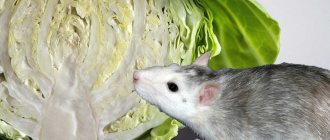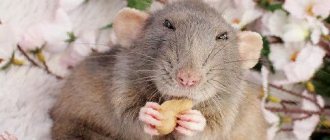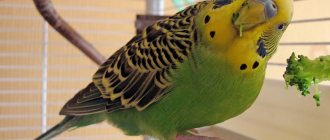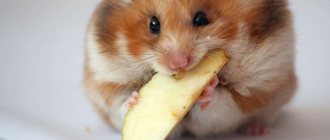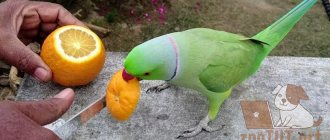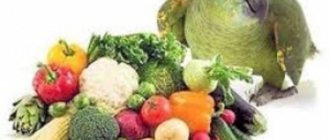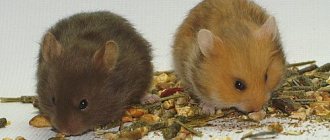Getting a new pet is always exciting, especially when you get a pet rat. One of the most important things to know is what your rodent can and cannot eat. This is important knowledge because feeding your pets the right food is essential to keeping them strong, happy and healthy.
Prohibited Products
Any prepared food, especially fried or spicy food, is prohibited for rats; canned food; sweet; alcoholic drinks; sweet drinks.
It is also undesirable to feed your pet from the owner's table: the food sold in specialized stores is already balanced and includes all the necessary vitamins. If you give your pet food from the table, the animal may refuse its food. Afterwards, it will be very difficult to wean the animal off junk food.
If you want to pamper your pet with fruits or vegetables, it is very important that they are in season, otherwise there is a risk of poisoning from harmful pesticides that are used for quick growing and long-term storage.
Grains and cereals - which ones should you avoid?
Grains form the main diet of rats, but it is necessary to know which grains can be fed and which cannot.
- Wheat is allowed for rats, but requires supplementation with other types of grains. Very high in calories. Wheat can be diluted with rice, buckwheat, corn and other grains.
- Buckwheat is considered dietary, has few calories, and can be added to the diet of rats.
- Corn, on the contrary, is high in calories; it is advisable to give it less often than others and as an additive to other grains.
- Oats - can cause fermentation, so it can be given, but in small quantities.
- Rice is considered to have little nutritional value, so it is advisable to feed either wild or brown rice.
- Semolina does not contain anything beneficial for the rat’s body, and veterinarians advise excluding it from the diet.
- Millet or barley - they can be given in the form of ready-made porridge for weakened animals, or for nursing offspring; adults can sometimes be given for variety.
What is the best food for rats?
Pet store rat food is generally the best option for first-time rat owners. Once you know the details of your pet rat's nutritional needs, you can create your own diet if desired.
When shopping for pet rat food, it is important to look for a formula made with high-quality ingredients. Remember that pet rats need a diet with a balanced content of proteins, fats and carbohydrates. Make sure the formula doesn't contain too much fat or calories, and make sure it has enough protein.
Here are some of the best options for commercial rat food:
- Oxbow Essentials Regal Rat Food
– This balanced rat food is formulated for adult rats. It provides a rich blend of nutrients without going overboard with fat to help your pet rat maintain a healthy body weight. - Mazuri Mouse & Rat Food
- Designed for all life stages, this balanced rat food is formulated with high-quality ingredients including omega-3 fatty acids to support your pet's healthy skin and coat. - Vitakraft Complete Nutrition Natural Foraging Blend
– If you are looking for a nutritious way to add variety to your rat's diet, this food blend is a great choice. It consists of nutritionally balanced granules mixed with seeds and vegetables.
Choose your pet rat food wisely because it will be the main source of nutrition. Follow the feeding recommendations on the package to ensure your rat is getting the right amount of food each day.
Vegetables and greens
Vegetables are very healthy and are allowed to be consumed daily, but in small quantities.
- Cabbage - any kind is undesirable for consumption, because... causes fermentation.
- Broccoli – can be given as an occasional treat.
- Radishes/turnips/radishes and some legumes (beans, lentils) cause increased discomfort due to gas formation, so their consumption is undesirable.
- Carrots/zucchini/pumpkin are very healthy, rich in vitamins, so their consumption is recommended.
- Eggplants/artichokes – only boiled ones are allowed; when cooking for an animal, adding salt or spices is not required.
- Cucumbers/beets – can cause stomach upsets in the form of diarrhea, so their consumption is undesirable.
- Potatoes have no value and are even prohibited in their raw form.
- Dill/parsley/celery, etc. are very beneficial for the digestion of rats, so it is advisable to add greens to their food daily.
- Tomato/sorrel – contain acid, consumption by rats is undesirable.
General principles of rodent nutrition
Diet
It is recommended to feed rats twice a day, that is, in the morning and evening. A bowl of dry food and a drinking bowl with clean drinking water should always be in the cage. The daily food requirement is 30 g per adult, of which fresh vegetables account for 5-7 g.
It should be remembered that rats are active at night, so the evening portion should be slightly larger than the morning portion.
There is another approach to the feeding regimen - only in the morning, but a larger portion. It should consist of dry food and something soft and tasty, for example, cottage cheese or porridge. First, the pet will eat something tastier, and by the evening he will have dry food left. Using this method is acceptable, but not recommended.
It is advisable to give food at approximately the same time. During the day, the interval between feedings is selected individually, but you should not make it too long.
What do rats love most?
When treating your rodent with treats, you should remember about the compatibility of products. You can give grains together with vegetables, fruits or nuts. You should not combine two types of protein, such as seafood and meat. Fermented milk can be given with fruits, vegetables and grains, but with great caution.
There are several varieties of rats' favorite food.
- Ready-made store-bought treats.
Sold at any pet store. They come in the form of grain sticks, which can easily be hung in a cage on a special hook, cookies for rodents, and drops.
IMPORTANT! It is necessary to carefully check the composition of the product; many of them contain allergens. If you have doubts about the composition, then it is better to avoid it. It is worth protecting your rats from low-quality additives in store-bought treats.
- Baby food.
Can also be used as main food. Perfect for babies or sick individuals. When treating your pet with medication, you can mix it into baby puree. It is not recommended to give meat food more than 1-2 times a week to an adult rat.
- Fish and meat.
This includes boiled shrimp, lean fish and beef, boiled chicken breast and necks, and eggs. It is better to mix the boiled yolk with water until it becomes a paste, so that the rodent does not choke. It is worth remembering that when feeding seafood, the smell of urine becomes stronger.
IMPORTANT! When cooking, do not use salt or spices. Feeding sausages and sausages is strictly prohibited.
- Fresh vegetables, fruits and berries.
This type of food must be included in the daily diet. It is recommended to peel fruits and vegetables. Pineapple, citruses and kiwi should not be given, because they are very acidic , which can adversely affect the animal’s general well-being and lead to allergies.
- Nuts, seeds and dried fruits.
They are very high in calories and there is no need to get carried away with them.
- Dairy products.
Yogurt, cottage cheese, kefir. Fat content from 1.5% to 5%, no added sugar. It is not recommended to give regularly because it may cause diarrhea. Some rodents are lactose intolerant; in this case, it is enough to observe the rat and its reaction to the product.
- Chocolate.
The serving should be no larger than a pea. Cocoa content of at least 70%, bitter and without additives. Again, don't forget about calories!
- Cookies and crackers.
Perfect for rats to sharpen their teeth. It is worth remembering the high calorie content and giving it no more than 2-3 times a week.
What foods should you exclude?
- fruit seeds;
- almond;
- any type of cabbage;
- radishes, radishes and turnips;
- legumes (beans, beans, peas, chickpeas, lentils, soybeans);
- raw artichokes, eggplants, potatoes;
- beets;
- rhubarb;
- sorrel, spinach and watercress;
- horseradish;
- citruses;
- green bananas;
- feijoa pineapple, figs and rowan;
- pears, grapes and plums (possible, but with caution);
- sour cream, cream, butter and cheese;
- lamb, pork, duck and goose meat;
- sausage products;
- alcohol, carbonated drinks, coffee and tea;
- mushrooms;
- confectionery and honey;
- chips and crackers with spices;
- dried and smoked fish;
- fresh bread and pastries.
Fruits
- Citrus fruits are prohibited for consumption, because may cause allergic reactions due to increased acidity. A piece of tangerine is allowed as a treat (sometimes).
- Forest/garden berries – the acidity of the berry must be taken into account. Cranberry is very useful, but you need to give it a little and watch the reaction.
- Pear – may cause fermentation, should be given occasionally.
- Plum – has a laxative effect, its use in the diet of rats is undesirable.
- Watermelon/melon – a small amount is allowed, but must be seasonal.
- Dried fruits can also provoke fermentation; they are given occasionally as a tasty treat.
It is important to know that eating seeds from berries and fruits is unacceptable; they are very harmful to animals and can cause poisoning.
Let's sum it up
As you can see, organizing a proper and healthy diet for a rat is not so difficult, the main thing is to be careful and follow the recommendations. It’s a completely different matter when owners want to pamper their pets, give them something tasty, thinking that they are benefiting the animal, but actually harming their health.
If you give a rat a choice in food, namely putting a variety of food in the cage, you can be sure that they will choose only the most delicious, and not the healthiest. Therefore, it is the owner who must organize and properly balance the menu, without relying on the taste preferences of the rodent.
Proper nutrition is very important for them, since it is what determines the health and long life of the animal. Monitor the rat’s condition, activity, good mood, appetite, appearance, habits; if changes are noticed, go to the veterinarian, who will give the right recommendations.
Milk products
All dairy products will be beneficial to your rat's health, but it is important to be aware of the possibility of a lactose allergy. It is advisable not to give pure milk, but other fermented milk can be given, but without fanaticism, you need to introduce new products little by little, observing the reaction. It is also undesirable to consume homemade sour cream/cream/cheese; often such products have a high fat content, which can cause digestive disorders.
Possible and useful:
- cottage cheese;
- fermented baked milk;
- pure yogurt;
- kefir.
Any fermented milk product should have no more fat than 4%. When it comes to low-fat products, it is advisable to choose non-perishable or children's dairy products.
Treats for your pet
Like people, decorative rodents really enjoy their favorite treats. In addition, these cunning animals often manipulate their owners, sitting in front of a full bowl of food with a pitiful look, begging for all sorts of goodies.
However, you should be very careful, since all treats often bring a good mood to your animal, but in too large quantities they are harmful to its health.
You can easily purchase many ready-made treats at any pet store. It is best to choose ones that do not contain flavorings, dyes, as well as sugar and salt. Most rodents love nuts, seeds, various dried fruits, and corn flakes.
Sometimes you can pamper your pet with unsweetened cookies for diabetics, pieces of slightly dried bread, and a minimal amount of chocolate.
For some animals, their favorite treats are pasta, eggs, meat, sausage, in general, everything that you eat yourself. Again, sometimes you can give all this, but always in moderation and infrequently.
What to exclude from your diet
We have already figured out what you can feed your rodents, but it is equally important to know which foods are strictly prohibited.
These include:
- raw meat and fish;
- food with all kinds of spices;
- fruit pits;
- raw vegetables;
- alcoholic and carbonated drinks;
- blue cheeses;
- too fatty dairy products;
- leaves of indoor flowers;
- citrus;
- sweets;
- salty food;
- unripe fruits;
- cucumbers, beets, spinach.
We hope this article helped you figure out how to properly feed decorative rats. Despite the fact that these animals are omnivores, you should not feed them just anything, as this can lead to serious health problems.
By adhering to simple rules regarding the diet of your pets, you will be able to admire for a long time how they grow and enjoy life.
Do not forget that the main component of the diet is grains and vegetables. However, for proper nutrition, animals also need animal proteins, fermented milk products, fruits and a variety of greens.
